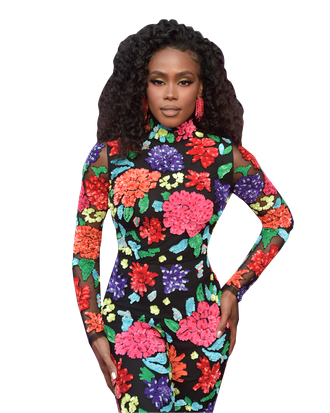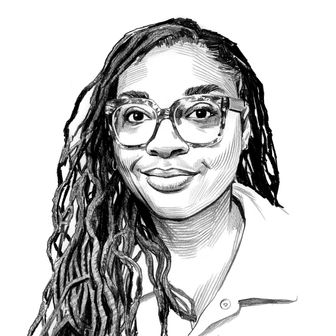
Shannon Thornton celebrated her birthday in Mexico last month, but if you ask certain superfans of P-Valley, Katori Hall’s groundbreaking Starz drama, she should’ve been working on changing her character’s destiny instead. Thornton plays Keyshawn, a young mother of two working as a dancer at the Pynk, the strip club that serves as the nucleus of the series. Her character is trapped in a perpetual cycle of abuse at the hands of Derrick, her high-school sweetheart and the father of her children, and the ups and downs of their relationship have catapulted some viewers into a parasocial attachment to Keyshawn. “Some people approached me seriously, speaking to me as if I’m really her,” says Thornton. “I have to remind them, like, ‘You know this isn’t real?’ People have started GoFundMes!”
It’s a testament to both the writing and reception of the show that loyal watchers express concern for Thornton’s safety or, more dramatically, insist she find a way to kill her fictional evil boyfriend. Her character arc is rife with fairy-tale symbolism like this — one of the most well-received episodes of the season, “White Knights,” was inspired by Cinderella and provided an origin story for Keyshawn, including her early romance with Derrick. The episode also addresses themes of colorism, agency, and domestic violence. By the finale, which aired this month, Keyshawn finally snaps when her plan to escape is ruined by the intervention of child-protective services, leading to a violent outburst that ends with her in jail.
Keyshawn’s season-two story line ends with a major cliffhanger in the finale. How did you feel about it?
Watching episode ten back, I got emotional. I was very surprised because I knew what was going to happen. It was something about the woman from child-protective services berating Keyshawn and saying all these heartbreaking things. That really affected me when I filmed it, but it’s heartbreaking to watch.
When Keyshawn implodes at Derrick in the finale, what was it like to portray such intense emotion in a short scene?
It was a long time coming for Keyshawn. She’s had so much anger and pain built up inside her. In the script, Katori wrote that Keyshawn lets out this guttural scream for the millions of women who have come before her who’ve experienced this kind of pain. She just unleashes on him, like, You know what? Fuck this. I’ve lost everything right now. If I’m going to jail, I’m going to beat your ass.
Exactly, because what does she have to lose at that point?
Right! Hearing on the day you’ve planned your escape and you’re so close to freedom that child-protective services are going to keep you in this place for six months and will do supervised visits with the kids … in that moment she just snapped and couldn’t take it anymore. And to see Derek is enjoying it?
How did you feel about the fan’s reception of the finale?
There were a lot of people in season one who felt Keyshawn deserved whatever she got after she pulled a gun on Diamond; a lot of people thought, She’s earned her karma. The empathy people have for Keyshawn this season is pleasantly surprising, especially after the flashback episode that showed where she comes from and her history of abuse and trauma in her formative years. That made her who she is today and affects her logic and her decision-making.
Keyshawn’s origin story was one of the most popular episodes of the season. What was it like to have the spotlight on your character for an entire episode?
Those were the two hardest weeks I’ve had in a very long time. I was in almost every scene. Katori told me what was to come before I knew there would be an episode for Keyshawn alone. I’ve never carried an entire episode. I was scared. I wasn’t sure I was capable.
How do you keep yourself sane and protect yourself as a person while playing a character in a traumatic situation?
I’ve struggled with that. It’s so much darker than season one. It was really difficult to go home and not take her with me. I still felt her spirit lingering in me long after the scene was done. In a big fight scene in episode five, Keyshawn is spitting out blood, she’s been dragged by her hair across the room, there’s an iron to her face. The director would say “Cut,” and I was still crying and very upset. It stayed with me even until the next day. As actors, it’s our job to trick our minds into believing imaginary circumstances are real, and our bodies don’t know the difference. When I feel like I’m losing it in the middle of a scene and have to relive this traumatizing experience over and over again at different angles, I have to remind myself I’m safe, we’re acting, it’s pretend, and I’m telling a story that’s really important. Even saying to myself out loud, “Just let it go.”
The fans are very loyal and engaged, especially Black women, because P-Valley is telling stories in a way we haven’t seen before. The colorism aspect in particular is approached in such a fascinating way: A lot of dark-skinned Black women can relate to how far we’ve come but how far we still need to go. Do you relate to Keyshawn’s story when it comes to colorism?
I do. There have been people who saw this episode and didn’t think it was believable that someone who looked like me could experience colorism. But it rings very true in my personal experience. I’ve been in situations where men found another woman more attractive simply because she was lighter, not because facially she was more beautiful. I think what Katori did in that episode is very realistic. People often think you have to be unattractive to experience colorism, but that’s not the case at all.
I spoke about it after the episode, and there were people who thought I was saying that because I’m bitter — that dark-skinned women make things up. They go, “Get over it. Maybe that person didn’t like you.” I was sharing my experience but being fully misunderstood.
Is it frustrating to explain that to fans who don’t believe your experience?
It is a bit frustrating. Colorism has absolutely nothing to do with physical beauty. To explain that to fellow Black people who are of a similar complexion … that part was more confusing than frustrating. The gaslighting from Black men who acted like colorism doesn’t exist was frustrating. I don’t think all Black men are colorists or anything like that, but the people who were defensive and offended by my comment about my personal experience were Black men.
In your heart, what is Keyshawn’s dream ending?
I want Keyshawn to be happy and make better choices when it comes to relationships and love. And loving herself more than the person she wants to be with. She is the prize, and she is special and worthy of love that doesn’t hurt. I want her to make all the money in the world and have all of the success and a stable home environment. And to get out of jail.
Oh, yeah, we need that!
She hit a police officer, and I believe that’s a felony, so I don’t know how she’s gonna get out of that situation.
I’m not gonna wish death on Derrick but let’s get him out of the picture.
[Laughs.] People like him deserve all the bad things!
On a lighter note, what was it like working with Future on his music video?
That was a two-day shoot in Miami, and I had the best time. I did not know what to expect, but he was very sweet, very quiet, and super-professional. When I was approached to participate in the video, I wasn’t exactly sure what they wanted me to do because it is Future. I love his music — we play it all the time in P-Valley because you hear Future all the time in strip clubs — but I’m very aware of the content. Am I going to be the girl crying in the car?
But then I heard the song and I’m like, This is the first time Future has been this vulnerable, and it’s the first time he’s ever spoken about a woman in this light. I had a conversation with the director, and she told me what the video would be about and how he doesn’t end up with the girl at the end — it was this story of love lost, and the women would be portrayed as beautiful goddesses, and all the men had clown makeup on. I thought it was really cool of him to poke fun at himself. This is him facing the consequences of his actions and not being rewarded for his poor behavior. That sold me.


